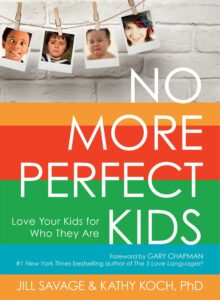Why Do Kids Make Mistakes?
An excerpt from
No More Perfect Kids by Jill Savage and Dr. Kathy Koch

Does it ever feel like your child does more wrong than they do right? As a parent, we know our kids aren’t failures. They can fail a quiz here and there, not win a tournament, and not earn a raise during their first job review, but none of that makes them failures.
They will make mistakes, though, because they’re human! To best help our kids overcome their mistakes and not feel like failures, we need to understand why they make mistakes. When a parent understands, it increases their compassion and decreases their frustration. As you listen closely and observe intently for the “why” behind their mistakes, you can know how to best support them.
Let’s explore eight reasons kids make mistakes.
1. They need more experience.
When kids complain that school is hard, remind them that if it were easy, they wouldn’t need to go. School—and much of life—is about trying new things. We must let our kids know they’re not stupid when they get things wrong. Mistakes are a part of life, and they often show up when we need more experience.
2. They need to be taught in order to be successful.
Mistakes can occur when content and tasks are new and teaching hasn’t yet occurred. Kids might enjoy trying things on their own, but then can get very frustrated when their independent approach doesn’t go well. Protect their self-esteem when you notice that the reason they did something wrong was simply because they need help or more instruction.
3. They need more time to learn something.
Errors occur because kids didn’t learn something well enough, although teaching has begun. These mistakes are a part of learning. They happen, and it’s no one’s fault. How did you learn to drive? By driving imperfectly for a while. How did you decide which barbeque sauce you prefer? By cooking with one and then another. Did you make a mistake? No. It was a “learn by doing” experience, not a “mistake by doing” experience. The language we use to discuss mistakes matters; this includes what we say to our kids and what we say inside our heads when thinking about them.
4. They need healthy motivation to do things well.
Sometimes kids make mistakes because they don’t want the additional pressure that comes with excellence. Maybe your son’s teacher keeps calling on him because he’s always attentive and right, but your son wants to take a break from that. Maybe your oldest is feeling like all your happiness is on her shoulders. That’s unhealthy motivation and creates a lot of pressure for any child.
5. They need our understanding and attention.
Kids will occasionally fail at something or make mistakes just to push our buttons. Let’s face it: They are smart little people even at a young age, and they learn the power of manipulation early.
In these cases, responding with understanding is important. When the time is right, and depending on their age, let them know you understand they’re angry or frustrated but you’d rather have them talk with you about their feelings than to act their feelings out.
6. They need more modeling and instruction related to character and obedience.
Sometimes mistakes are an issue of character. Kids might hurry through a task or assignment so they can get back to their video games. They can choose to not double-check their work because pride is in their way and they’re just convinced they haven’t made any mistakes. As parents, we need to discern whether our children are making occasional errors in judgment or if they’ve developed consistent character flaws that need to be addressed.
7. They need self-respect, self-control, and respect for others modeled for them and taught to them.
Sometimes kids’ strengths get them into trouble. Too much of a good thing is not a good thing! For example, word-smart kids might talk too much. Logic-smart kids with a heightened curiosity may ask questions to keep you distracted and to extend bedtime. We don’t want to paralyze their strengths by overreacting and being too critical, but we do need to teach the concepts of self-control and respecting others.
8. They need sleep, food, and/or emotional stability.
Do you sometimes underperform or make unhealthy decisions when you’re tired, hungry, or emotionally vulnerable? So do kids. You might discover your daughter should start her homework after having a snack. Your son may not be handling the long day of school well and may need to go to bed thirty minutes earlier than you originally thought. To track patterns, you can keep a written record of their misbehavior using a calendar or a list. After recording a few days of when mistakes and misbehavior occur, who was present, if it was near mealtime, or if they were fatigued, you can often identify possible strategies to decrease the misbehavior.

It’s okay, in the midst of mistakes, to verbalize that your child is not failing or a failure. Look for impressionable moments when kids need the reassurance that making mistakes is how people learn. You may not be happy with their choices, and discipline may be necessary, but also let them know they’re not stupid.
In fact, letting our kids know they’re not mistakes even when they make mistakes is very important for us to communicate, especially in the hard days of parenting!
This excerpt is from No More Perfect Kids, a new Hearts at Home book by Jill Savage and Dr. Kathy Koch! Pick up your copy of the book between March 13-23 and you'll get over $100 in bonus resources! Find out more at NoMorePerfect.com!














